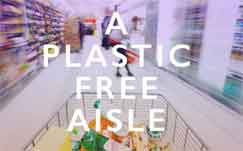Andy Clarke, who spent six years as CEO of Asda, the Walmart-owned grocery chain that is the third largest in the UK, is one a mission to significantly reduce or even eliminate plastic packaging from products in retail stores, and is calling on retailers and vendors to lead the charge.
"Go into any supermarket in the country and you will be met by a wall of technicolour plastic, be it fruit and veg or meat and dairy, plastic encases virtually everything we buy," Clark was recently quoted by the UK's SupplyManagement.com web site after leaving Asda last year.
Clark believes almost all plastic can be replaced with alternative packaging materials, including more sustainable alternatives such as paper, steel, glass and aluminum.
Why are some of those materials preferable to plastic? Because plastic doesn't recycle very well, Clarke says.
"Unlike materials like aluminum and glass, plastic packaging cannot be recycled ad infinitum., Clarke noted, adding that "Most items of plastic packaging can only be recycled twice before they become unusable. Recycling will never offer a durable solution to the plastic crisis -we simply have to use less plastic in the first place."
About1 million plastic bottles are bought per minute in the UK alone, with volumes predicted to double within the next two decades and quadruple by 2050, according to an estimate by the Guardian newspaper.
What's more, other estimates say only 29% of plastic in the UK is reportedly recycled each year. Meanwhile, some 5-13 million tonnes of plastic finds its way into the world's oceans, where it is often ingested by sea birds, fish and other organisms.
In the US, the web site BantheBottle.com says that Americans used about 50 billion plastic water bottles last year, and that the recycling rate for plastic bottles is only 23%, with much of the remainder also findings its way into oceans, lakes and rivers.
And that is not only an environmental issue and danger to marine life. SupplyManagement.com cites research from Scientists at Ghent University in Belgium, who recently estimated that UK residents who regularly eat seafood ingest up to 11,000 tiny pieces of plastic every year.
What's more, in July ten top UK food-security specialists and doctors warned in a column in the Daily Mail newspaper that chemicals found in packaging are potentially dangerous if consumed every day. The scientist claimed disposable plastic wrappers leave traces of toxic phthalate chemicals on the surface of foods, a substance that has been shown to cause cancr.
Clarke is calling on grocery chains in the UK and around the world to create what he calls "plastic-free aisles," to show what is possible and to feature the wealth of alternatives to plastic including innovations like grass paper.
 In fact, there is a Green organization called Plastic Planet whose whole mission is about pushing for creation of plastic free aisles in stores. The group's web site says it is "working with politicians, scientists, charities, NGOs, packaging manufacturers, consumer goods producers, and supermarkets themselves to deliver the campaign's aim." In fact, there is a Green organization called Plastic Planet whose whole mission is about pushing for creation of plastic free aisles in stores. The group's web site says it is "working with politicians, scientists, charities, NGOs, packaging manufacturers, consumer goods producers, and supermarkets themselves to deliver the campaign's aim."
Clarke noted the challenges of trying to reduce the use of plastic through recycling and other techniques with an example from Asda, which he said attempted to use thinner plastic milk bottles containing more recycled material a few years back. But that led to bottles bursting, so eventually Asda went back to the original bottles.
"Regardless of how much is invested in Britain's recycling infrastructure, virtually all plastic packaging will reach landfill or the bottom of the ocean sooner or later," Clarke added
Interestingly, a simple web search shows there seems to be far more interest in the plastic-free aisle in the US than in the United States, where the term is rarely used.
Is it time for the plastic free aisle? Why is this idea so much bigger in the US than US? Let us know your thoughts at the Feedback button below.

|